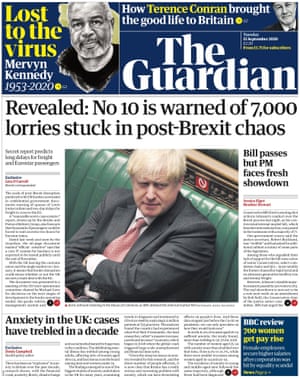
[ad_1]
Top story: ‘Most astonishing thing I can recall’
Hello, Warren Murray bringing you the news – let us tarry not.
The government’s bill to partly ignore the legally binding Brexit withdrawal agreement has passed a Commons vote with a comfortable majority, but also with a slew of senior Tories declining to give their support. MPs voted by a majority of 77 to approve the internal market bill which would let the government override key elements of the Northern Ireland protocol that Boris Johnson agreed with the EU.
Only two Tory MPs directly voted against the bill: Andrew Percy and Sir Roger Gale, the latter saying afterwards that Britain should “obey international law. I believe the United Kingdom’s word is its bond and I think this is damaging our international reputation for honesty and straight-dealing.” Another 30 Conservatives abstained – though this could be for a number of reasons – including the former chancellor Sajid Javid and the former attorneys general Geoffrey Cox and Jeremy Wright.
One abstainer, Sir Charles Walker, called the breach of international law “profoundly un-Conservative” and, alluding to divisions within the party, warned: “If you keep whacking a dog don’t be surprised when it bites you back.”
The bill now moves to its committee stage and a showdown is looming over an amendment put forward by Bob Neill, the Conservative chair of the justice select committee, that seeks to give parliament a veto if ministers try to use their powers under the bill to override the UK-EU divorce deal. Here are some of the MPs who could make things awkward for Johnson. This morning the former UK ambassador to the US, Kim Darroch, says the bill is “the most astonishing thing I can recall through my entire public service career”, and that it threatens to damage British prospects of trade deals with the US and EU. “It puts at risk future international agreements, if people think the Brits are just going to say: we didn’t like this on reflection, and we would like to rewrite this part unilaterally.”
Alcohol binge in lockdown – A near-doubling in the number of higher-risk drinkers during lockdown has led to warnings that addiction services in England are struggling to cope. The Royal College of Psychiatrists has found the prevalence of people drinking at higher risk was at almost a fifth (19%) in June – equating to more than 8.4 million people and up from around 4.8 million four months earlier. The college is calling on ministers to reverse cuts and help local authorities work towards investing £374m into adult services to address the increased need for treatment.
Britain’s anxiety attack – Anxiety has trebled among young adults in the UK over the past decade, according to a study, and now affects 30% of women aged 18 to 24 while increasing across the board among men and women under 55. The financial crash, austerity, Brexit, climate change and social media are all implicated, and there is a clear generational divide: anxiety is unchanged among those aged 55 and over, who tend to be less affected than younger people by big uncertainties in areas such as housing and job prospects. Brian Dow, deputy chief executive of the charity Rethink Mental Illness, said: “If we are to reverse this trend and prevent a problem becoming a crisis, the social contract we provide to young people has to have a better set of terms and conditions.”
‘Threshold of new era’ – Benjamin Netanyahu, the Israeli PM, will be at the White House today to sign agreements with Bahrain and the United Arab Emirates that establish open business, direct flights and diplomatic relations. Israel has only previously made peace deals with Egypt and Jordan. Netanyahu has hailed it as “the threshold of a new era” as Israel moves closer to some Arab states, in large part due to a shared enmity towards Iran. But the agreements have also been dismissed as a spectacle confected by the Trump administration, since both Bahrain and the UAE already had extensive informal ties with Israel.
Home carers win backpay – Ten homecare workers have been awarded an average of £10,000 each in backpay after a tribunal ruled it was unlawful not to pay them for travel time between clients’ homes. The tribunal, in a case brought by the Unison trade union, ruled up to 60 minutes of travelling and waiting time between appointments should be paid to the carers, who did 14 hours a day in their jobs looking after elderly and disabled people, but were effectively receiving less than the minimum wage. Unison said the judgment setting out how the workers calculated how much they were owed – in part by using Google maps and public transport apps – would help workers in similar situations challenge their employers for underpayment.
Carbon removed from search results – Google and Facebook are becoming carbon neutral businesses, joining competitors Apple and Microsoft in committing to put no excess carbon into the atmosphere. Google says it has managed to retroactively offset all carbon it has ever emitted, since its foundation in 1998. It has also committed to being powered exclusively by renewable energy by 2030. Facebook says it will this year become 100% supported by renewable energy and commit to net-zero emissions for its entire “value chain” by 2030 including suppliers and users. Amazon lags its peers somewhat with a plan for net-zero carbon emissions by 2040, and 100% renewable electricity use by 2030.
Today in Focus podcast: Don’t blame the young for Covid
Before introducing new rules banning private gatherings of more than six people, the health secretary pointed the finger at young people for increasing rates of coronavirus. But could this blame game be counterproductive?
Don’t blame the young for Covid
Lunchtime read: Blow up your debt
Hilary Powell and Dan Edelstyn filled a gold van with £1m in banknotes then blew it up. As their film Bank Job hits the screens, the art avengers explain how they took on toxic debt culture – and won.

Sport
Jofra Archer insists England have not forgotten the spirit of the Black Lives Matter movement and that Michael Holding had not done his research when criticising the team’s decision to stop taking a knee. Dave Brailsford’s Tour de France selection gamble has backfired, as the 2018 winner of the Grande Boucle, Geraint Thomas, showed he was back to his best with second place overall in Italy’s prestigious Tirreno-Adriatico stage race. UK Athletics is planning to cut all its major events staff responsible for staging prestigious Diamond League meetings and also intends to reduce its anti-doping team, the Guardian can reveal.
Owen Farrell is steeling his Saracens teammates for their Champions Cup quarter-final against Leinster by adopting Johnny Sexton’s role in training this week. New Zealand’s prime minister, Jacinda Ardern, has confirmed quarantine rules will be relaxed to allow Australia sufficient time to prepare for next month’s two Bledisloe Cup matches against the All Blacks. Yorkshire were left without four senior players, including captain David Willey, for their T20 Blast match against Lancashire at Headingley due to a coronavirus-related issue. And Novak Djokovic says he has accepted his default from the US Open but he understands it will stick with him for a long time as he prepares to return to competition this week at the Italian Open.
Business
Asian equities have extended gains while the dollar has slipped, with investor sentiment supported by Chinese data and optimism about Covid-19 vaccines. Chinese blue chips added 0.4%, buoyed by data showing China’s industrial output rose 5.6% in August from a year ago, expanding for a fifth straight month. In market movements Japan’s Nikkei has fallen while South Korea and Australia have made small gains. The FTSE is flat ahead of the open while the pound is worth $1.285 and €1.081 at time of writing.
The papers
Nice work from the i headlines its splash “Bruising Commons victory for Johnson” after the internal markets bill passed but not without a hail of opprobrium. The Guardian’s final edition has that as “Bill passes but PM faces fresh showdown”. Our print splash is “No 10 is warned of 7,000 lorries stuck in post-Brexit chaos”. Confidential government documents drawn up by the Border and Protocol Delivery Group and seen by the Guardian predict the scale of disruption including possible two-day delays to cross into the EU and thousands of passengers waiting an extra two hours for Eurostar trains.

Test shortages also feature in the Guardian and elsewhere. “Crisis in hospitals with health workers unable to access tests” says the Telegraph. “No trace of a test” reports the Metro while the Times has “Virus tests run out as labs struggle with demand”.
“For the sake of 35,000 lives we must act now” implores the Express, referring to backlogs for cancer treatment. “Britain turns to drink” says the Mail in reference to these findings. It’s “Unbelievable” fumes the working-class Mirror that “families are banned from meeting up” and “neighbours are told to spy out on each other” but “don’t worry, the government says you can still go grouse shooting with 29 chums”. A younger Boris Johnson is pictured sporting tweed and clutching a brace of fowl. And the FT is on TikTok, saying the proposed partnership with Oracle “faces White House hurdle to approval”.
Sign up
The Guardian Morning Briefing is delivered to thousands of inboxes bright and early every weekday. If you are not already receiving it by email, you can sign up here.
For more news: www.theguardian.com
[ad_2]
Source link